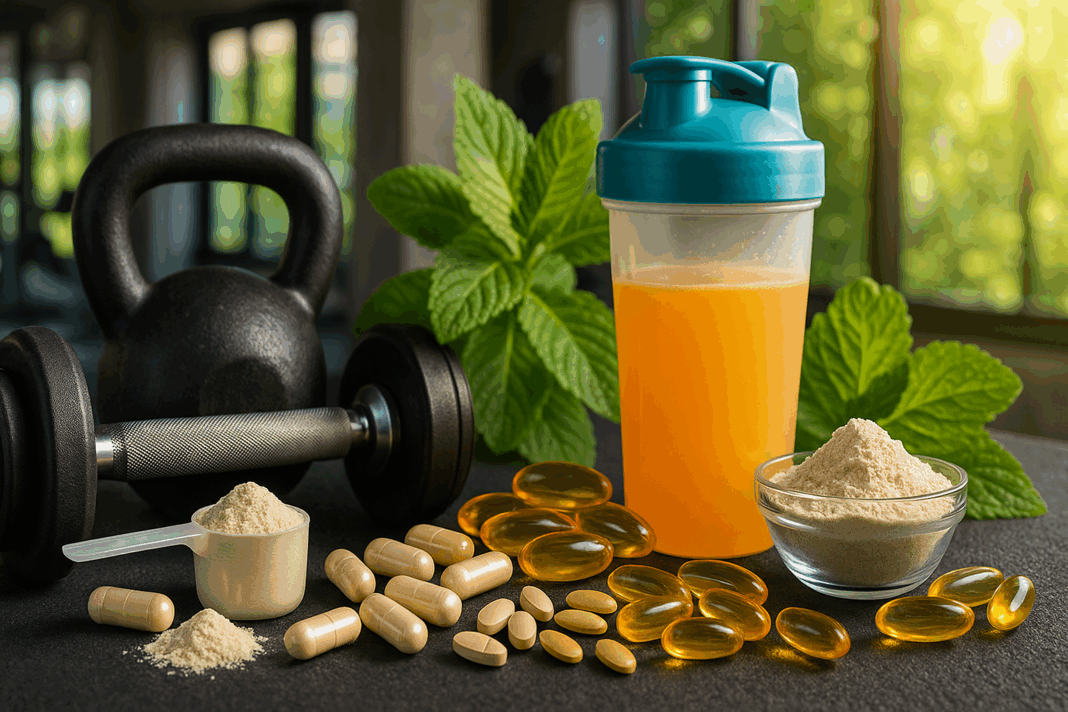Achieving your fitness goals requires more than just a consistent workout routine. While regular exercise lays the foundation for improved strength, endurance, and overall well-being, the body also needs the right nutrients to support its performance and recovery. For many, the conversation around fitness begins with training techniques and ends with protein powders. However, the true key to unlocking peak physical performance may lie in understanding the critical role that vitamins and supplements play in this process.
The growing body of scientific research continues to highlight how nutritional support can elevate workout capacity, enhance endurance, and speed up recovery. But not all supplements are created equal, and individual needs vary based on age, gender, intensity of training, and health status. Particularly for adults over 40, the physiological changes that come with aging—like a decline in testosterone levels, reduced muscle mass, and slower recovery—make choosing the right support especially important. For those wondering what type of supplement can improve exercise performance and capacity, or searching for the best vitamins to take when working out, a deeper dive into the science behind supplementation can offer much-needed clarity.
You may also like: Build Strength that Lasts: Best Supplements for Stamina and Endurance Backed by Science
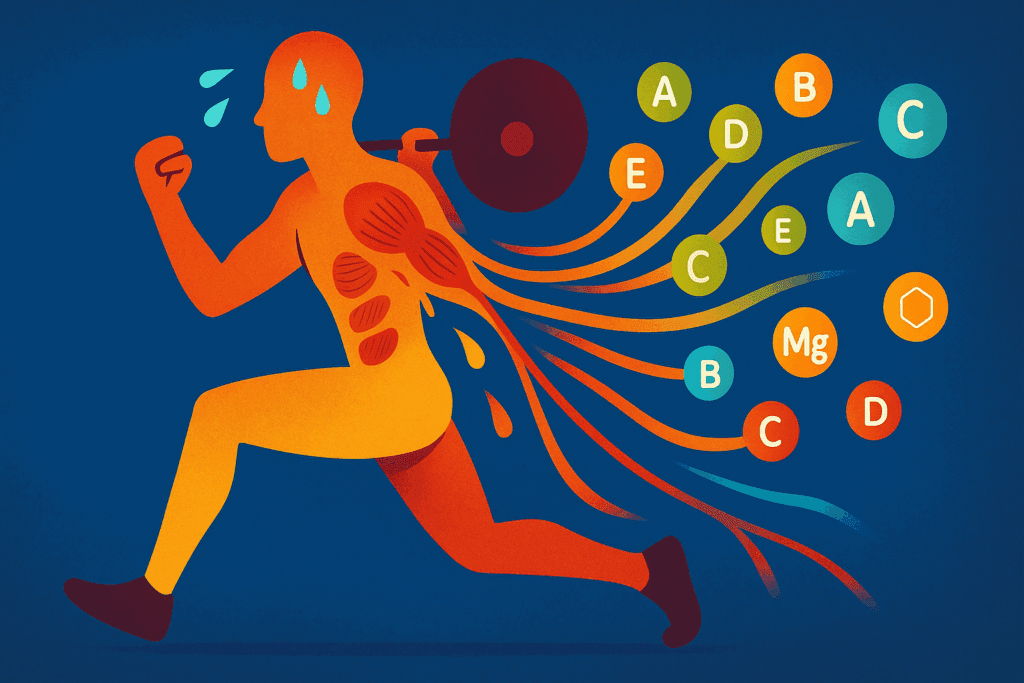
Understanding the Nutritional Demands of Exercise
Exercise places a significant demand on the body’s resources. When you push your muscles, increase your heart rate, and challenge your endurance, you also deplete a wide range of nutrients. Water-soluble vitamins like B-complex and vitamin C are flushed out through sweat. Meanwhile, fat-soluble vitamins, including vitamins A, D, E, and K, may become depleted over time if dietary intake isn’t optimal. Intense physical activity also taxes minerals such as magnesium, zinc, and iron, all of which play pivotal roles in energy metabolism, oxygen transport, and muscular function.
Furthermore, oxidative stress tends to increase during workouts due to elevated oxygen consumption, which produces more free radicals. Without adequate antioxidant support, these free radicals can damage muscle tissues, reduce performance, and delay recovery. Therefore, supplementation is not simply a tool for performance enhancement—it’s a protective strategy. Understanding these mechanisms helps explain why the best vitamins to take while working out go far beyond the usual suspects of protein and caffeine. They involve a comprehensive approach that targets metabolic function, cellular repair, and hormonal balance.
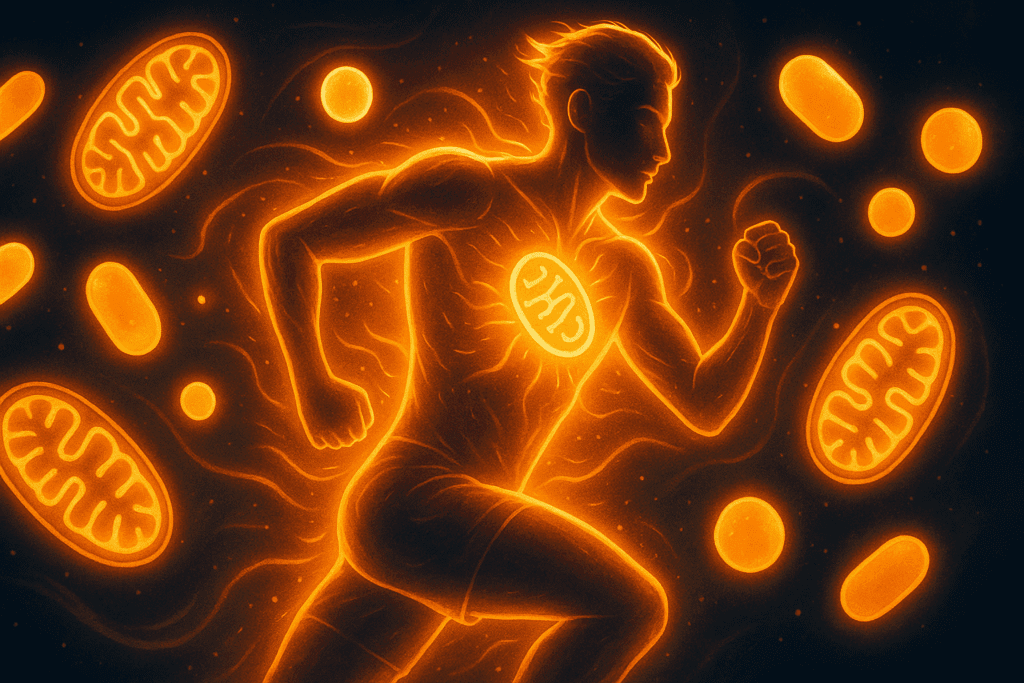
Vitamin B Complex: The Metabolic Powerhouse for Active Bodies
One of the most essential groups of nutrients for active individuals is the B vitamin complex, which includes B1 (thiamine), B2 (riboflavin), B3 (niacin), B6 (pyridoxine), B12 (cobalamin), folate, biotin, and pantothenic acid. Each plays a distinct and crucial role in the body’s energy metabolism. These vitamins help convert carbohydrates, fats, and proteins into usable energy, which is vital for maintaining stamina during prolonged exercise.
Vitamin B6 and B12 are particularly important for red blood cell production and neurological function, which contribute to oxygen transport and muscle coordination. B2 and B3 support the mitochondria—the energy-producing centers of the cells—making them indispensable for endurance athletes. A deficiency in these vitamins can lead to fatigue, decreased exercise capacity, and impaired recovery. For this reason, many athletes include a quality B-complex supplement in their daily routine, identifying it as one of the best vitamins to take when working out. The synergistic effect of these nutrients ensures a steady energy supply while also aiding in muscle repair and cognitive clarity during demanding physical activity.
Vitamin D and the Muscle-Strength Connection
Often associated with bone health, vitamin D also plays a significant role in muscle strength and function. Research has shown that individuals with low vitamin D levels tend to experience decreased muscle strength, slower reaction times, and a higher risk of injury. This is especially relevant for men over 40, who naturally face a decline in both bone density and muscular mass.
Vitamin D aids in calcium absorption, which is essential for muscle contraction. It also influences the function of fast-twitch muscle fibers—those responsible for explosive strength and sprinting capabilities. The immune system benefits, too, as vitamin D helps modulate inflammation, reducing the risk of post-exercise soreness and infection. Given that many people, especially those living in northern latitudes or working indoor jobs, are deficient in vitamin D, supplementation becomes essential. Including vitamin D among the best vitamins to take while working out is not merely about preventing deficiency—it’s about optimizing muscular and skeletal resilience under physical stress.
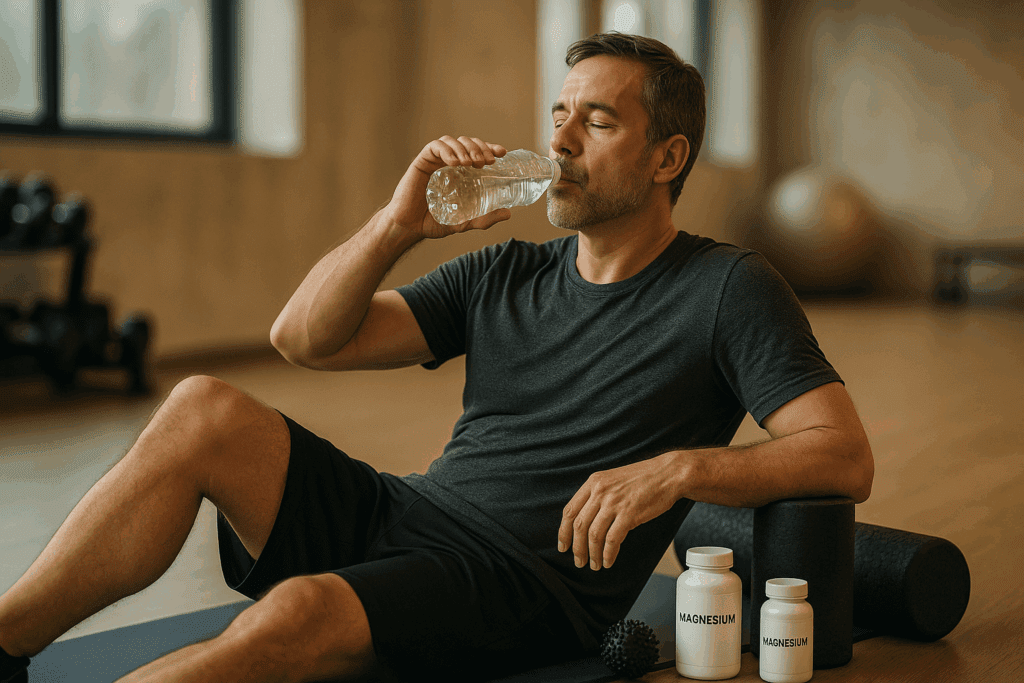
Magnesium: The Unsung Hero of Recovery and Relaxation
Magnesium is a mineral that supports more than 300 biochemical reactions in the body, many of which are directly tied to exercise performance. It plays a central role in muscle contraction and relaxation, protein synthesis, and nerve function. Without enough magnesium, the risk of muscle cramps, spasms, and fatigue increases significantly.
For athletes and fitness enthusiasts, magnesium is also vital for sleep quality and recovery. Poor sleep impairs recovery and reduces the benefits of training, making magnesium supplementation especially beneficial for those who engage in high-intensity or endurance sports. Magnesium also supports heart rhythm and helps regulate blood pressure—two critical factors during cardiovascular exertion. For men over 40, in particular, magnesium can help manage age-related stress, reduce cortisol levels, and support testosterone production. It is no surprise that many consider it one of the best workout supplements for men over 40.
Creatine Monohydrate: Enhancing Explosive Power and Muscle Mass
Creatine monohydrate is one of the most well-researched sports supplements in the world, and its benefits are particularly relevant for those focused on resistance training and high-intensity intervals. It works by replenishing adenosine triphosphate (ATP), the primary energy molecule used during short bursts of activity. This leads to improved strength, speed, and lean muscle mass.
Notably, creatine is also neuroprotective and supports cognitive function, making it beneficial beyond just the gym. Its safety profile and proven effectiveness make it a cornerstone in the discussion about what type of supplement can improve exercise performance and capacity. While creatine is naturally produced in the body and obtained through dietary sources like red meat, supplementation is often necessary to achieve the performance-enhancing threshold.
For men over 40, creatine may help counteract age-related sarcopenia, or muscle loss, and support greater power output during training. When paired with resistance exercises, creatine can enhance body composition, improve workout intensity, and promote long-term muscular health.

Omega-3 Fatty Acids: Reducing Inflammation and Supporting Heart Health
Omega-3 fatty acids, particularly EPA and DHA found in fish oil, offer a range of benefits that extend well beyond general wellness. For active individuals, these healthy fats help reduce exercise-induced inflammation, promote faster recovery, and support cardiovascular health. Omega-3s also improve endothelial function, which enhances blood flow and oxygen delivery to working muscles.
Additionally, omega-3s influence protein metabolism and may reduce muscle soreness after intense training. In the context of aging, omega-3s help combat stiffness in joints and reduce the risk of cardiovascular events—a concern that becomes more prominent for men over 40. Including omega-3 fatty acids as part of the best workout supplements for men over 40 not only promotes longevity but also sustains performance in a safe, natural way.
Adaptogens and Herbal Enhancers: Nature’s Tools for Resilience
The world of herbal supplementation is vast, but certain adaptogens have gained recognition for their unique ability to support physical performance and resilience. Ashwagandha, Rhodiola rosea, and Panax ginseng are among the most studied for their ability to enhance stamina, regulate stress hormones, and improve focus.
Ashwagandha, in particular, has been shown to increase VO2 max, or maximal oxygen uptake, which is a key indicator of aerobic endurance. Rhodiola supports mitochondrial energy production and reduces fatigue during prolonged exertion. Ginseng enhances mental clarity, boosts immune response, and may help regulate blood sugar—factors that can influence workout consistency and energy levels.
These herbal tools answer the question of what type of supplement can improve exercise performance and capacity by working through different physiological systems. Unlike synthetic stimulants, adaptogens offer a balanced approach, helping the body adapt to stress without causing crashes or overstimulation.

Protein and Branched-Chain Amino Acids (BCAAs): Building Blocks for Recovery
While much has been said about the role of protein in muscle building, it’s worth emphasizing the nuanced benefits of high-quality protein sources and BCAAs. Protein provides the amino acids needed to repair and grow muscle tissue. BCAAs—leucine, isoleucine, and valine—are particularly important because they are metabolized directly in the muscle, promoting faster recovery and reduced muscle breakdown.
Supplementing with protein shakes post-workout can be especially useful for individuals with higher protein requirements or those struggling to meet their needs through food alone. For men over 40, who may experience slower protein synthesis, timely intake of BCAAs can help maintain lean mass and promote recovery. Considering them as part of the best vitamins to take while working out is justified not by their vitamin classification but by their critical functional role in the recovery process.
Coenzyme Q10: Cellular Energy and Cardiovascular Support
Coenzyme Q10 (CoQ10) is a compound that exists naturally in the body, particularly within the mitochondria of cells where it aids in energy production. Levels of CoQ10 decline with age, and low levels can lead to fatigue, reduced endurance, and compromised heart function. As such, CoQ10 supplementation becomes increasingly important, especially for individuals who are active and over the age of 40.
Studies show that CoQ10 can improve exercise tolerance by enhancing cellular respiration and reducing oxidative stress. It also supports heart muscle efficiency, which is critical for sustaining high-intensity workouts. Including CoQ10 in a supplement regimen is a smart choice for anyone looking to improve their stamina and protect long-term cardiovascular health.
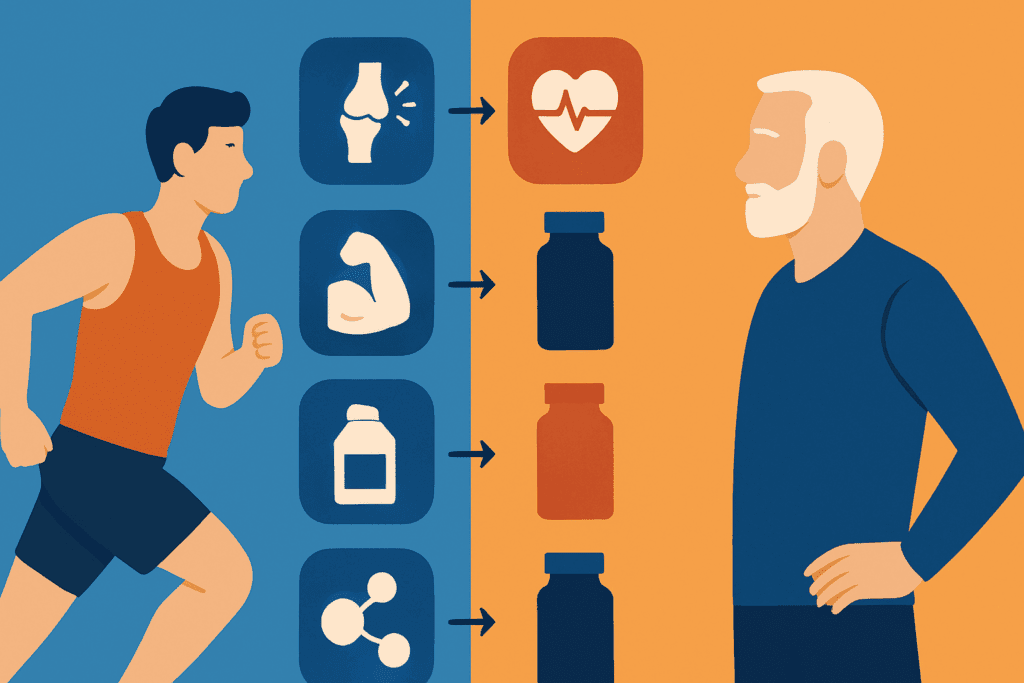
Choosing the Right Supplements Based on Age and Goals
Supplementation should never be a one-size-fits-all approach. The best vitamins to take when working out differ for a 25-year-old athlete compared to a man over 40 with changing hormone levels and metabolic shifts. Men in their 40s may benefit from supplements that support joint health, hormonal balance, and cardiovascular function, while younger individuals might focus more on muscle building and quick recovery.
It’s also essential to consider quality and bioavailability. Not all supplements are created equal, and poor formulations can result in low absorption or unintended side effects. Seeking out third-party tested products, reviewing ingredient transparency, and consulting with a healthcare provider or nutritionist can help tailor a regimen to your unique needs. Ultimately, aligning your supplements with your fitness goals ensures that every workout is supported from the inside out.
Frequently Asked Questions: Workout Supplements and Performance Nutrition
- Can micronutrient timing impact workout efficiency?
Yes, the timing of vitamin and mineral intake can influence how effectively your body utilizes these nutrients during exercise. Consuming water-soluble vitamins like B-complex shortly before a workout may help enhance energy metabolism while fat-soluble vitamins like D or E are better absorbed with meals. For those exploring the best vitamins to take while working out, it’s wise to pair supplementation with nutrient-dense meals to improve bioavailability. Some studies suggest that ingesting antioxidants too close to a workout may blunt certain beneficial adaptations, such as improved mitochondrial efficiency. Therefore, understanding nutrient timing is an important, often overlooked element of performance nutrition. - Is there a difference between supplements for endurance athletes and strength trainers?
Absolutely—endurance athletes typically prioritize cardiovascular efficiency, hydration, and glycogen conservation, while strength trainers often focus on muscle synthesis, explosive power, and recovery. The best vitamins to take when working out for strength might include vitamin D and magnesium for muscular contraction, whereas endurance athletes might lean more heavily on iron and B-complex for red blood cell support. For both groups, understanding what type of supplement can improve exercise performance and capacity based on discipline is essential. Even among seasoned athletes, misalignment between supplement type and training goal can hinder progress. Tailoring supplementation to your sport ensures you’re not just exercising hard—but also smart. - How do age-related changes affect supplement needs during exercise?
As we age, metabolic rate slows, nutrient absorption diminishes, and muscle mass tends to decline. This makes older adults, particularly men over 40, more susceptible to vitamin and mineral deficiencies that can impair performance. The best workout supplements for men over 40 often include magnesium, CoQ10, and omega-3 fatty acids, which not only support muscle health but also cardiovascular integrity and cellular energy production. Aging also brings hormonal changes that may require adaptogenic or testosterone-supporting ingredients. Recognizing how these shifts affect supplementation needs allows for proactive adjustments that preserve both performance and long-term health. - Can over-supplementation lead to negative performance outcomes?
Yes, excessive intake of certain vitamins or ergogenic aids can have counterproductive effects. For example, high doses of antioxidants like vitamin C or E might interfere with muscle adaptation to strength training. Similarly, overuse of stimulants such as caffeine can lead to adrenal fatigue, dehydration, or disrupted sleep—all detrimental to recovery and performance. This highlights the importance of selecting only the best vitamins to take when working out, in the right amounts, and within evidence-based parameters. Consulting with a sports nutritionist or healthcare provider helps ensure supplements serve as allies, not obstacles. Moderation, personalization, and quality are far more effective than megadosing or trend-chasing. - Are there emerging trends in supplement science that may redefine fitness routines?
Definitely. The next wave of innovation in performance nutrition is driven by personalized supplementation, gut microbiome optimization, and novel delivery systems such as liposomal encapsulation. DNA-based supplement plans are now emerging, providing insights into how your unique genetics interact with various compounds. For those wondering what type of supplement can improve exercise performance and capacity in the future, the answer may be highly personalized regimens that adjust in real time with wearable tech. This progression opens new possibilities for integrating the best vitamins to take while working out into daily routines based on physiological feedback. As precision health evolves, so too will the supplements we rely on to fuel our bodies. - How do environmental factors influence supplement effectiveness during exercise?
Climate, altitude, and even pollution levels can alter the body’s nutrient needs. For instance, training in high-heat environments increases the loss of electrolytes and water-soluble vitamins through sweat. Those living at high altitudes may require additional iron and vitamin B12 to support oxygen transport. In polluted urban settings, antioxidant support becomes more relevant to combat oxidative stress. Understanding what type of supplement can improve exercise performance and capacity in various environments helps athletes maintain consistency regardless of external conditions. Strategic supplementation acts as a buffer between performance goals and unpredictable environments. - Is there a connection between mood, motivation, and supplementation?
Yes, mental performance is just as vital as physical ability when it comes to sustaining a fitness regimen. Certain supplements, including B-complex vitamins, magnesium, and omega-3 fatty acids, can influence neurotransmitter activity and mood regulation. This means the best vitamins to take when working out may also support motivation, stress resilience, and mental clarity. Adaptogens like Rhodiola rosea and ashwagandha not only improve energy levels but may also blunt stress-induced performance dips. Incorporating mental performance supplements adds another layer of support, helping individuals stay consistent and enthusiastic about training. - How do supplement needs shift across different training phases (e.g., bulking, cutting, deloading)?
During bulking phases, there’s a higher demand for nutrients involved in anabolic processes, such as zinc, vitamin D, and protein-based compounds. When cutting, the focus shifts toward preserving lean muscle while minimizing fatigue, increasing the value of B-complex vitamins and electrolytes. During deload or recovery weeks, anti-inflammatory agents like omega-3s and curcumin can assist with tissue repair and systemic restoration. The best workout supplements for men over 40 during these phases may vary slightly depending on hormonal and metabolic context. Recognizing that supplement strategy is dynamic—not static—can amplify results and minimize plateaus. - Can food-first strategies be as effective as supplementation for active individuals?
Whole foods offer synergistic benefits beyond isolated nutrients, including fiber, enzymes, and bioactive compounds that aid in digestion and absorption. However, it can be challenging to obtain therapeutic levels of some nutrients through diet alone—especially for those with high activity levels, dietary restrictions, or limited time. That’s why even food-conscious athletes often incorporate the best vitamins to take while working out into their routine. Supplements are best viewed as nutritional insurance policies—supporting gaps rather than replacing healthy meals. The key is integrating them into a holistic dietary pattern, rather than treating them as standalone fixes. - What are the signs that your current supplementation strategy isn’t working?
Common indicators include persistent fatigue, muscle cramps, slow recovery, poor sleep, or unexplained plateaus in performance. These can be signs that you’re either missing key nutrients or using the wrong type or dosage of supplements. Evaluating your regimen through regular lab work and feedback from your workouts can help identify deficiencies or inefficiencies. For instance, if you’re using the best workout supplements for men over 40 but still feel sluggish or sore, it may be time to tweak dosages or explore complementary ingredients. Just as training evolves, so too should your approach to supplementation—always guided by outcomes, not assumptions.
The Bottom Line: Supporting Performance and Endurance with Targeted Nutrition
Whether you’re just beginning your fitness journey or looking to sustain high performance into your 40s and beyond, nutritional support remains a critical factor in success. When thoughtfully chosen and strategically used, the best vitamins to take while working out can bridge the gap between effort and results. They protect against nutrient depletion, enhance energy systems, reduce inflammation, and optimize recovery.
Knowing what type of supplement can improve exercise performance and capacity empowers you to take control of your health proactively. For men over 40, especially, integrating the best workout supplements for men over 40 ensures that aging does not mean declining performance—it can, instead, be a time of focused, functional growth. The synergy between smart training and tailored supplementation forms a strong foundation for sustainable wellness, endurance, and strength.
In a world where physical demands are high and recovery windows are limited, supporting your body with the right vitamins and supplements is not just a luxury—it’s a necessity. Approach your fitness with science, intention, and care, and you’ll not only see gains in the mirror, but feel stronger, sharper, and more energized in every aspect of your life.
Was this article helpful? Don’t let it stop with you. Share it right now with someone who needs to see it—whether it’s a friend, a colleague, or your whole network. And if staying ahead on this topic matters to you, subscribe to this publication for the most up-to-date information. You’ll get the latest insights delivered straight to you—no searching, no missing out.
Further Reading:
Vitamins and supplements for athletes

